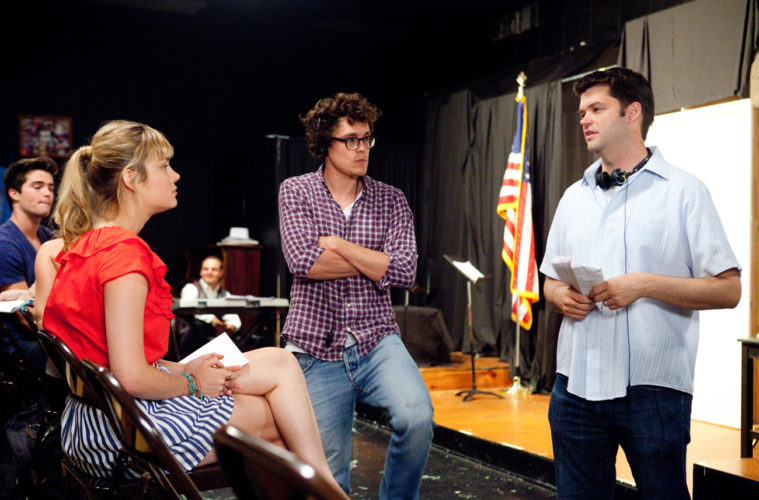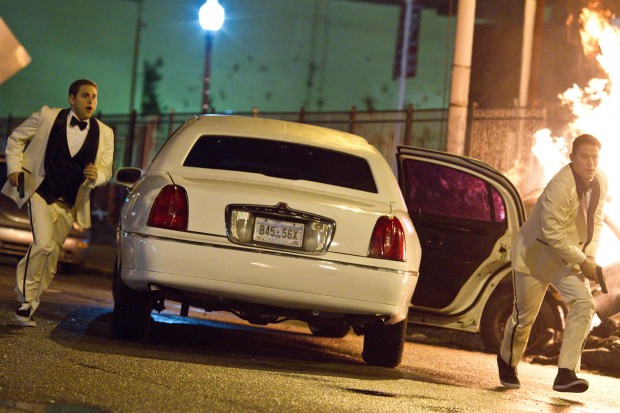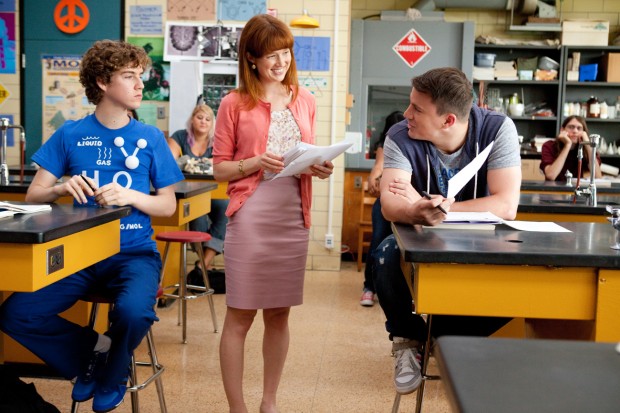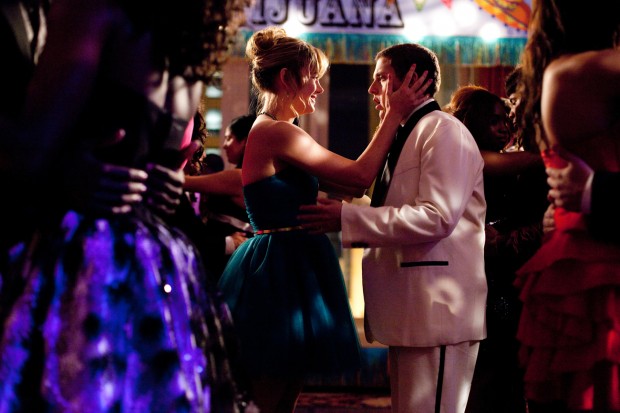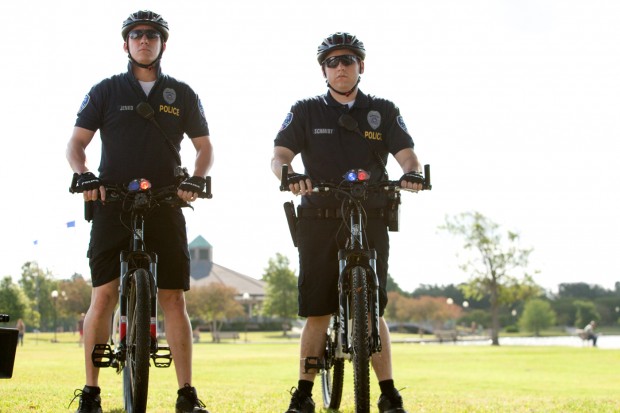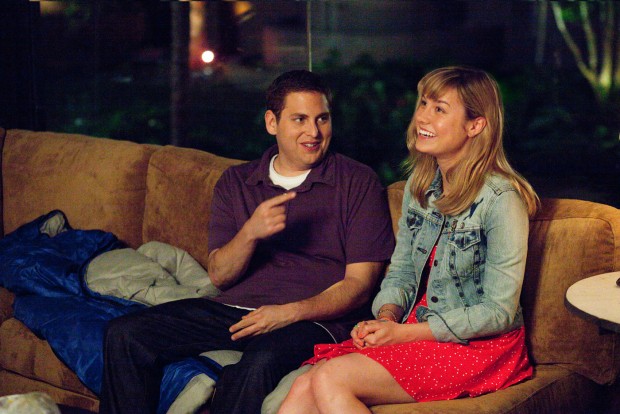
21 Jump Street is one of the funniest films we’re bound to get this year. There was a lot of trepidation because it seemed like a cash-in on a reimagined property, but that should not stop you. At SXSW I had the chance to sit down with co-directors Chris Miller and Phil Lord. During the roundtable interview we talked about improv, F-bombs and pulling off their own undercover investigation of a high school.
Can you talk a little bit about this trend in animators moving into live-action? We just saw Andrew Stanton do it this weekend with John Carter. We saw it at Christmas with Brad Bird.
Chris Miller: I’d like to be in company with those guys. [Laughs.] Those are talented guys. But there’s obviously a lot in common with animation and live-action. You’re trying to tell an interesting story that engages the audience. And in our case, in both Cloudy with a Chance of Meatballs and this, we were trying to make ourselves laugh and make audiences laugh. So, from a storytelling standpoint, there’s a lot in common. You obviously have a lot more prep work and it’s a lot slower in animation. You have [much] more specific control over how many beads of sweat are on somebody’s forehead. But a lot of the same principles are the same. We had a crew of 500 on Cloudy, and a great cast in that one as well. And it was the same thing in this one.
Phil Lord: You’re insane if you’re trying to make a live-action with the same degree of control as you are in animation. What you want to be doing is create a set that’s as spontaneous as possible and allows for as many accidental moments as possible. So in some ways, it’s sort of the exact opposite. In our case, on Cloudy we tried to have a community that encouraged people to make mistakes and try new things and contribute their own creative ideas. So it wasn’t that different for us. But certainly we threw the idea of meticulous control out the window. [Laughs.]
CM: Specifically, you know, Jonah [Hill] was on the project before we got there and we wanted to work with him. We thought he was a very talented guy.
PL: We still think that, by the way. [Laughs.]
CM: Yes. [Laughs.] Even more so now. And everybody that we cast, we wanted to be people who would be able to improvise and think on their feet quickly. We did a lot of chemistry reads with the guys to make sure that everybody could have the same sense of play and bounce things off of each other.
We talked to some of the other guys around here, [and] we were talking about how you guys had a great concept of improving and trying to get as much as you could out of these guys. Did that also make it somewhat difficult to kind of pick and choose, like, what’s the funniest bit? What do we keep and what do we lose?
CM: Absolutely, yeah.
PL: Hopefully there’s one bit that rises above the others. You’re in trouble when you’re like, “Oh, these all seem lateral.” Right? I did think that. Occasionally we would get confounded and then be like, “Is this, like, one percent funnier than the other thing?” [Laughs.] And we would try – we tested the movie a bunch – and we would try alternatives. But thankfully, almost in every case, there was like a clear winner.
CM: In our original, the assembly movie was three hours. [Laughs.] Because of all that stuff. And so we wanted to make sure that we were well under two hours. So we had to cut a lot of stuff. Some of it was really hilarious stuff that, you know, for pacing, we just – it didn’t drive the story forward enough or it just didn’t work in the context of the movie, so we had to let it go. But that’s what Blu-rays are for – deleted scenes and stuff.
PL: Forty-five minutes of deleted material. [Laughs.]
When it comes to working with R-rated material, was it freeing for you or was it something where, well, you can say this or you can say that, but how do we do it in a clever way?
CM: Absolutely. I think there’s nothing inherently funny about saying a swear word. [But] there’s freedom for us because having done Cloudy, there were very few swear words in that movie – comparatively. But you obviously want to make something – you want to be clever about it. So we actually did takes for almost every scene where they weren’t saying the swear words, to see what the alternate take of that was. And to have the option. So it was not just a complete, wall-to-wall obscenity.
PL: But it still is.
CM: It is. And somehow…We went to a lot of high school to do research and, you know, we even went to the Santa Monica High School prom. We were wearing tuxedos, and I can show you some pictures if you would like. [Laughs.] We had special permission from the school to go, and we had like special tags. We did try to go to the after-party and they did not let us in.
PL: Yeah, we were really interested in that stuff and they had done some crazy things. They rented some weird warehouse downtown and we drove all the way down there. This is, by the way, identical to my regular high school experience. [Laughs.] And we went down and we rolled up and they [said], “What’s the password?” And we were like, “Uh, we’re filmmakers, and we were wondering…” “Get out of here, narc.” [Laughs.] They wanted nothing to do with us. [Laughs.] So we went and had a hot dog.
It was like your own 21 Jump Street.
CM: It kind of was. We would make terrible undercover cops. But the kids, they had some pretty filthy mouths. The way they talked in real life was pretty filthy, so we didn’t want to censor it. We wanted to be accurate to the way kids were really talking.
Yeah, I’ve kind of noticed that when you see high school age kids, every other word is an F-bomb. But at the same time I think, “Did I talk like that when I was in high school?” Because that’s how everybody else talked, you know?
PL: I think it’s worse now. Do you know that story, The Big Space Fuck? It’s a Kurt Vonnegut story that he wrote about how, like, in the future the human race was going to die so they put a bunch of human genetic material in a rocket ship and shot it into outer space. [Laughs.] So that the human race would like go on after we destroyed our planet. And the conceit was that, at that point in human history, the language had deteriorated so much that it was like okay for the President to say “fuck” on television. [Laughs.] That was like completely normal. So we’re trying to get towards that. Yeah, we’re trying to get there.
So who was the worst offender on the set who did the most F-bombs?
CM: I mean, it was pretty universal. [Laughs.]
PL: It was pretty universal. Jonah’s pretty bad. We’re pretty bad. I’m probably worse than you. I don’t even think about it.
In working with all the actors – I mean, you had quite an ensemble there of comedy people – what did they do improvisationally that [made] you went, “Oh my gosh. We [have] to put this in.”
PL: There’s a lot of stuff. I mean, there’s something I don’t want to give away to audiences, but there is a climactic dismemberment that was improvised, believe it or not. [Laughs.] It’s a fun day at work when you have to say over the radio, “Does anybody have a severed penis? Can you get it to the set as fast as possible?” [Laughs.]
CM: There’s a scene where Jonah is calling Brie Larson on the phone and Channing [Tatum] starts messing around with him, and that was just us saying, “Channing, come in at this point and do whatever you want, use whatever props from the bedroom that you want.” And he has a lot of experience messing around with people. So that was great.
PL: And the other fun thing was that day at the park where we literally had like six hours to shoot the guys hanging out and being bored at their police job. And it was literally just like letting those guys tee off. Like, “What would you do if you were bored?” And we’ll do it in this location, and this one, and this other thing.
CM: It was really – we wanted to establish what good friends they were. And at that point – they didn’t know each other before this movie – it was about three weeks into shooting, and they had already become really good friends. They were having a real-life bromance right before our eyes, and we were just capturing it on film. So we got really lucky that we were able to exploit their actual, natural chemistry.
In animation, it often seems like the actors come in for a two-week period, they say their lines, and then they’re gone. There’s not a lot of leeway to get them to improvise because they’re there for a set amount of time. Speaking on that, the transition to [live-action], obviously you have these actors with you for a very long period of time. How did you deal with that sudden freedom to be able to have that improv?
CM: We tried, on Cloudy with a Chance of Meatballs, to try and get that spirit of improvisation because we just don’t like it when things feel canned. So we would, whenever possible, put actors together and have them play off of each other.
PL: [Much] to the consternation of our editor, and dialogue mixers, and sound mixers. [Laughs.]
CM: But it does give you a more natural performance [in] that you get things that you would have never thought of in scripting. But this was taken, obviously, five steps further than that because we had – from the beginning Jonah was aboard and he’s such a gifted improviser. [And] we didn’t want to limit that. So we intentionally cast everybody to be a good improviser, and it was great. We just wanted to make sure there was enough time in the day to be able to – to get the scene as it needed to be and to get everyone to know what the goal of the scene was and be able to make sure that the story was tracking. And that the characters were behaving in character and reacting in a real way. And just have enough time [also] to let people just try out stuff.
PL: It’s a great trick for a director to get people to put things in their own words and go off, because suddenly everyone’s responding spontaneously and in the moment. And your performances get better. I don’t know if I’m skilled enough yet to – if I was working with like a David Mamet script or something, and every word counted, and it had to be said with these ands, ifs, and buts in the middle because it worked out the rhythm perfectly. I don’t know. Maybe that’s a limitation as a director that like getting a natural performance of that seems so much harder than not being precious about the words and just letting them say it how they would say it and [getting] something honest out of that that comes from the actor’s brain.
CM: As long as the meaning stays the same and it feels natural for them. You know, I don’t know how to write a line the way Ice Cube would say it himself. [Laughs.] I don’t know him well enough. And so we just give him like, ‘This is the idea we want to get across, put it in your own [words].’
PL: And in a way, that’s their job. That’s what they bring to it. That’s why you cast them – for them to bring their special whatever to it.
You guys were saying that you shot the hotel thing – that was like the first thing you guys shot. Was it difficult to have to basically go back to the beginning and lead up to that?
CM: Yeah.
PL: But we had planned that a lot. The good and the bad of that as the first thing is that it takes a while for you to get on your feet as a director, [and] you [may be] in trouble. [Laughs.] But on the other hand, you get to plan that for all of prep, and you know that’s the first thing you’re doing. So you spend a lot of energy figuring out the choreography of that stuff.
CM: There was eleven people in that scene and we had like the blueprints and it’d be like, “This penny is Jonah, this candy is Channing, and these are the bikers, and this chess piece is this, and this piece of lint will be…” [Laughs.] And then we moved them around and there’s a lot of very intricate blocking in that.
PL: Yeah, but the really scary part was the next week when we were at Jump Street and the set wasn’t finished until, like, the day we got there. And we hadn’t had enough time – because we were doing all these rewrites – to really plan out where everything was going to be. And we had to kind of make that stuff up as we went. But yeah, that was a pretty crazy week. We are blessed to have great collaborators and great actors and a real generous crew that was there to support us.
Do you have any favorites scenes – ones that were really like, “This is the best that I’ve ever done.”
PL: [Laughs.] I don’t know about the best we’ve ever done. My favorite stuff is stuff that like people came up with and that surprised us. That [we] weren’t expecting to happen. Jonah and Channing did an awesome scene – two awesome scenes, I guess – in a bathroom. I could talk about both of them. [Laughs.] One is one where they’re like gagging each other in each other’s mouths. And we were doing a lot of takes that day because we were shooting some action stuff and they were kind of nervous that we were going to do, like, eleven takes with each other’s fingers down each other’s mouths. [Laughs.] They were like, ‘You guys get one [shot] at shooting this stuff. The rest we’re going to fake it.’
And one of the great surprises was how funny it was when they finally did it and they were really, incredibly grossed out. And [there] was something so alive about that. And then we also have a scene where the guys have been in a fight and they have to go save the girl at the end and they have to apologize to each other but it’s not written as an apology. It’s written as, ‘Will you go to prom with me?’And I love it because it was [screenwriter] Michael [Bacall’s] idea that that was going to be the line and they were never going to say, ‘I’m sorry.’ And those guys like came out of their trailers with a take on how to perform it and they basically did it without a lot of extra direction from us and it’s a really heartfelt scene and because it’s so heartfelt, it’s really funny. And I love it. And I didn’t have that much to do with it. Just setting the cameras up.
CM: One of my favorite scenes is when the guys have to take drugs and they have a crazy drug trip whilst at school. And that was a great confluence of stuff that was written on the page by Michael, stuff that the guys – Rob Riggle, Jonah and Channing – came up with on their own while we were shooting it and got into the scene and just said, ‘Okay, I’m just going to drool.’ And [we] let that happen. And then stuff that we did later in the editing room where we were like looking online and found this crazy cathead puppet and were like, ‘Well, what if we do this?’ And making weird title cards and trying to crack each other up in the editing room. And it was just an escalation of everybody working together to make something crazier than you would expect.
21 Jump Street is now in wide release.

